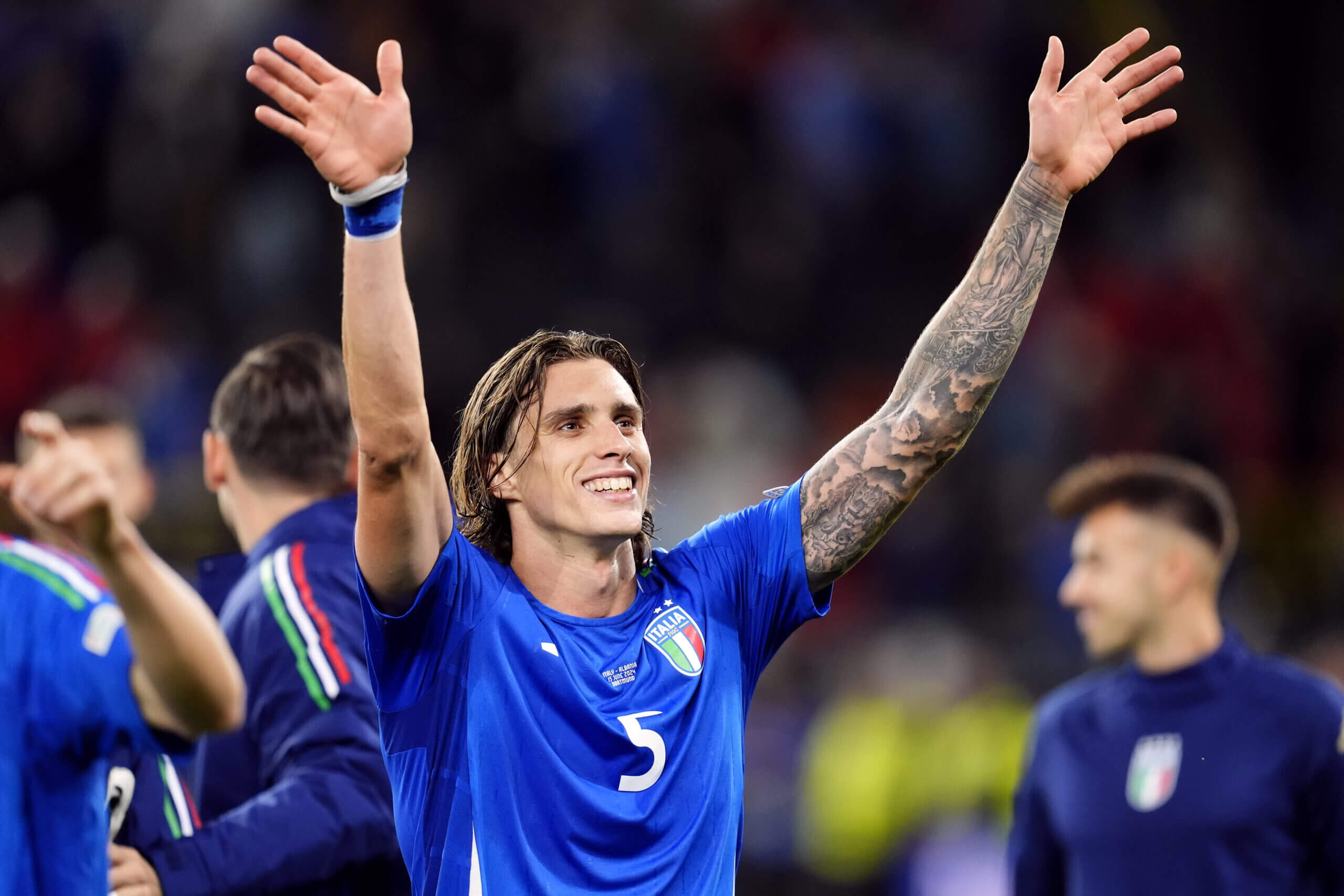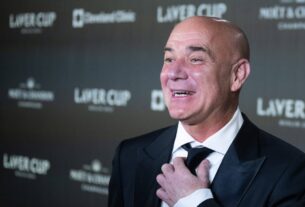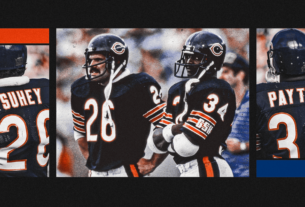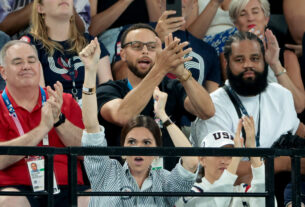San Daniele del Friuli was an atmospheric neighbourhood trattoria in Highbury that was once a regular destination for Arsenal’s players and management. It was located a five-minute stroll from the stadium’s marbled entrance.
On Champions League nights, it stayed open late and diners would clap warmly as manager Arsene Wenger came in for a bite to eat with vice-chairman David Dein. Players Patrick Vieira, Robert Pires, Sol Campbell, Freddie Ljungberg et al often arrived, showered and changed, to unwind with friends after the game. The owners, a pair of brothers who supported Udinese and Arsenal, treated everyone like family.
For a long time, that was about as strong a connection as could be found between Arsenal and Italy.
The signing of Riccardo Calafiori from Bologna in a move worth up to £42million ($54m) feels momentous for those of an Italo-Arsenal persuasion. It is the first time the club have signed an Italian with star quality, a player in that country’s best traditions of ‘calcio’ who has his best years ahead of him.

GO DEEPER
Why Arsenal signed Riccardo Calafiori
It is perhaps peculiar that so few Italian players of note have made their way to Arsenal.
Italy might not be an exporter of footballers to match France and more recently Spain, which have been dominant forces across the continent since the major leagues began to cross-fertilise their talent in the 1990s. But it is still quite high in the list of nations other than England represented in the Premier League since its inception.
Non-English nations by number of Premier League players
The Italian community in London has thrived since the 1800s, with the northern boroughs of Islington — the club’s heartland — and neighbouring Camden among the most populous areas for Italians who settled here.
Maybe it had something to do with never having an Italian manager, or maybe it’s just a curious quirk, but Arsenal have rarely gone down that footballing path.
Niccolo Galli was the first Italian to join Arsenal. A talented defender, he moved to Arsenal’s academy in 1999 and was part of the group that won the FA Youth Cup a year later. He was extremely highly regarded but, at a time when it was still relatively novel to move abroad as a teenager, returned to Italy for a loan period to continue his studies and football development. Tragically, he was killed in a moped accident on his way home from training aged 17.

Galli was Arsenal’s first Italian player (John Walton/EMPICS via Getty Images)
Arturo Lupoli arrived in 2004 and fitted the mould for ‘project youth’ — a period when Arsenal intentionally headhunted young players with high potential to help the club cope with cost-saving measures as they paid for the building of the Emirates stadium.

GO DEEPER
Lupoli: ‘I was at Arsenal in maybe the best years of their history – it was a great time’
Cesc Fabregas was the pick of a bunch that included Nicklas Bendtner, Denilson, Carlos Vela and Philippe Senderos — teenagers who were coveted by scouts across the world as best-of-a-generation prospects. Lupoli was a talented forward who had broken scoring records as an under-17. But it never quite happened for him.
Then came Vito Mannone, a goalkeeper who was mostly a reserve during his Arsenal years. He spent eight years at the club and when he left was replaced for a season by Emiliano Viviano, who never played a competitive match. Arsenal then went almost a decade without an Italian until coach Mikel Arteta signed the Brazil-born Azzurri midfielder Jorginho from Chelsea at 31.
Pierluigi Pardo is a familiar voice on Italian TV as the primary commentator for Serie A matches on broadcaster DAZN Italy. He has strong roots in English football after living in London in his younger days, where he developed an affection for Arsenal.
“Italy is not traditionally a great land for football exports,” he says. “Italians are more comfortable at home. When players started to move more freely across Europe, Arsenal were dominant in France, and there was a greater Italian connection with Chelsea.”
Gianluca Vialli and Gianfranco Zola became beacons in blue for Arsenal’s London rivals. Together, with the craze around Fabrizio Ravanelli at Middlesbrough, they brought all the sparkle of established stars when they came to England in 1996. But Italian players in the Premier League have seldom been as dazzling in the two decades since that generation.
It is also notable that the most successful and high-profile Italians playing in England have tended not to be defenders — maybe surprising considering the hallowed status of the position in Serie A and for the Azzurri.
Andrea Rosati grew up in Parma, northern Italy, and first came across Arsenal when the two teams met in the 1994 Cup Winners’ Cup final.
Initially, mere mention of the club’s name sickened him after Arsenal did a job on a stylish Parma, winning 1-0. But, over time, Rosati grew to admire and adore Arsenal and they became his English club of choice. “The values of the club, particularly after Arsene Wenger came, glued to me,” he says.
He is fascinated by the cultural changes that see someone like Calafiori arrive at Arsenal with a worldly outlook, excellent language skills, and a capacity to adapt that is modern and exciting.

Calafiori, second-right, next to now-Arsenal team-mate Jorginho at Euro 2024 (Cesare Purini/Mondadori Portfolio via Getty Images)
“When I was growing up, Serie A in the mid-1990s was the driving force of football and attracted the best players in the world,” he says. “It looked like the Premier League is now.
“There was no great appeal to leave Serie A. Italian players were not generally willing to leave and there were certain things about England that were not so inviting. Quite apart from the physical reputation of the football, there was also basic stuff like the weather and food!
“Then Vialli happened, and Zola happened, and that changed the entire image. The Premier League became a thing. Sky TV arriving in Italy opened up the window to other countries and leagues.”
Rosati observes that in the past decade, perspectives have been broadening. Language is no longer the barrier it once was, as the current generation pick up linguistics and ideas over social media. “The world is smaller,” he says. That Calafiori could express himself in his signing video in fluent English is significant.
Benvenuto, Riccardo Calafiori 🇮🇹
Meeting new teammates for the very first time ❤️ pic.twitter.com/JbUhqOBCMN
— Arsenal (@Arsenal) July 29, 2024
As an Arsenal fan, Rosati is thrilled by Calafiori’s signing. “It is stunning,” he says. “He is flying, and was particularly keen to choose Arsenal. He is a great match with what Arteta represents and wants. What impresses most is probably his character. When he suffered a bad injury as a teenager, he reacted with such courage to come back and to follow the path, in moving abroad, that would best help his football.”
That injury, and his choices afterwards, made a big impression on Pardo. “Going to Basel (Calafiori left Roma to join the Swiss team in 2022) was a brave, open-minded decision,” he says. “Not many in Italy would have made the same choice at 20 years old. Going to Switzerland, rather than staying in Italy to try to rebuild his career, challenged him personally and professionally but it was very good for him. It is like a student going on (European Union exchange programme) Erasmus, experiencing a different country and different habits. It is a sign of his personality.

GO DEEPER
Riccardo Calafiori, Arsenal’s new defender who got lifts from De Rossi and models his game on Stones
“Since then, Calafiori showed incredible growth in Bologna and then confirmed his quality with the national team during the Euros. He is in the tradition of great Italian defenders. Even aesthetically, he reminds us of Paolo Maldini or Fabio Cannavaro when he had hair. He has technical quality, physical strength, and consistency. Potentially, he is great.”

Calafiori helped Bologna reach the Champions League last season (Image Photo Agency/Getty Images)
The country’s official branch of the Arsenal supporters’ club, the Italian Gooners, are thrilled to have one of their own to support. They already had a banner at the Emirates — maybe it will be amended with some new visuals, or a hair transplant for decoration. Expectations are high.
“I like how he already has a chant to the song, ‘That’s Amore’, which is welcoming him with his Italian culture to north London,” says Cico Tagliavini, who lives in Highbury and has family roots in Bologna.
“I am even more happy because he is coming from Bologna, who propelled his career in a historic season (they reached the European Cup/Champions League for the first time since 1964), which is an extra source of pride. He is going from one of the teams I support to the other one. I am so excited to see him and he will be doing it on the biggest stages of all.”
As the legendary former Italy centre-back Leonardo Bonucci said, “He’s going to be a reference point for our national team for the next 15 years.”
Arsenal can only hope he achieves something similar for them.
(Top photo: Nick Potts/PA Images via Getty Images)





